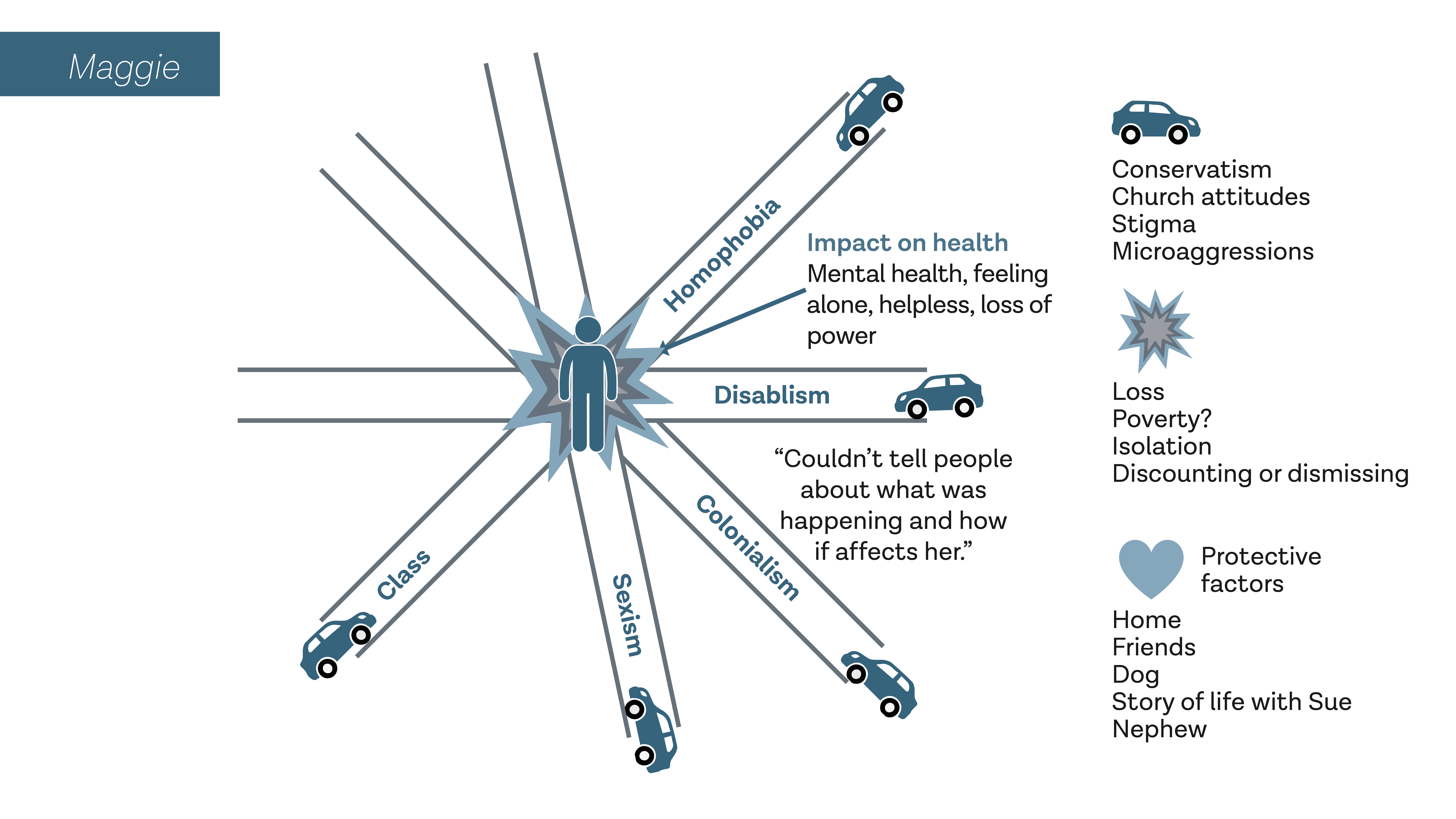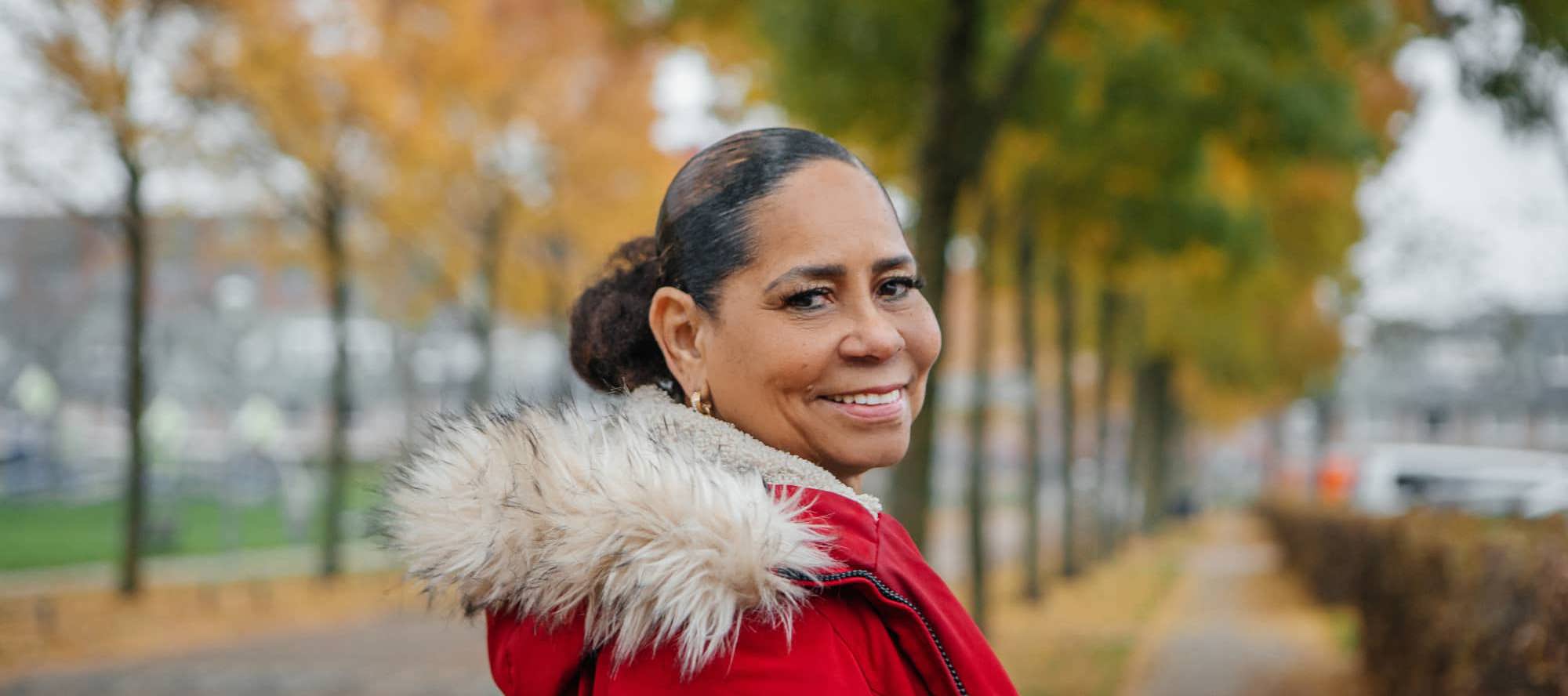Maggie's story
Listen to Maggie's story and hear the views of practitioners and leaders providing support.
Part of the 'Equity Change Project'
Introduction
Listen to Maggie's story below.
I live with my dog Bailey. I used to live here with Sue.
Sue is, was, my dear friend. My partner, really, though I never liked that word. I don’t think it tells everything about her. I always said Sue was my friend.
We lived together for 22 years and then she died. It was a heart attack in January 2020. Just before Covid, so that was that year.
I was older than Sue and she brought home the money. She worked in the library, well, she had a degree. I came to England from Cork when I was 17. So it was because of Sue that I have this house with no mortgage and have some savings. For a rainy day, Sue said.
I haven’t been back to Cork since the 90s. I’ve family there.
Sue’s nephew Rob is a dear man. He lives a few hours away and he is busy. But he rings every month and visits every few months, though not during the Covid of course. Rob sorted out everything after Sue died.
I have friends. A lot of people were friends with Sue. And there are the neighbours and people I know from town. There is a local Irish club and church of course. But I don’t go. There’d be too many questions about it all, about Sue and home.
I haven’t told anyone before now but I am worried that I am losing track of things. I have forgotten a lot and I keep mixing things up. I went to the GP and had some tests. I’m waiting to find out, and to be honest, I am terrified. I just want to get myself together.
What does allyship look like for Maggie?
You are the practitioner who goes out to talk with Maggie.
You have limited information about her situation. You know that she lives alone, her partner recently died, and the GP is concerned about her not managing at home due to some confusion.
Maggie tells you a bit about her life and you piece together some of the intersecting roads of oppression that are impacting on her.
Reflective question
What is different about using intersectionality in work with Maggie?
- We gave a lot more weight to her sexuality, faith, ethnicity, beliefs – it made us look at it from a different perspective, in particular using an intersectional lens enabled us to make links between her factors of identity and context.
- We did not just look at the problem e.g. self-neglect but at the wider context and how that could contribute, intersectionality helped us look through a wider contextual lens.
- Intersectionality helps to think about the cumulative impact of taboo on experience and how to respond to this.

Worked example of the intersection for Maggie.
Reflective questions
How can you be an ally for Maggie?
How else can she find allyship?
- Thinking of allyship as a form of practice made us focus more on equity, diversity and inclusion and in this way it made us focus more on social justice than when we use advocacy.
- Importance of using intersectional listening to Maggie’s story, understanding more about her background - to identify the strengths and solutions she has.
- Think about how we can amplify Maggie’s voice.
- Under the lens of allyship, intersectionality could help identify the potential connections with Maggie’s community, e.g. church, Irish community, dog-walking community. Allyship also helped us to think about why these social connections might be tricky in terms of homophobia.
I’m a newly qualified social worker in the older people’s team. I have been working here for about 9 months. My manager asked me to take the referral about Maggie. We are very busy so she hoped that I could go out and sort it in one visit.
I’ve been out to talk with Maggie and I think there is quite a lot going on. She found it hard to talk at first but then said quite a lot. We only talked about what has happened to her. She is grieving. We didn’t get into much about what might help.
Maggie reminds me of my grandmother a bit. She was Irish too and came over in the 1960s. It is because of her that my mum is Catholic and married a Catholic. I still have family in Dublin.
There are often things that overlap with personal experience in this job. You have to be careful about how your views affect your practice, for example I grew up hearing views that same sex relationships were wrong. I don’t think that and it wouldn’t affect how I work with someone anyway, but you do need to be aware.
I have supervision with my Manager and I want to talk to her about Maggie and ask her for some more time to work on this. I want to see Maggie again and look at what support might be useful. I think this needs to include emotional support.
Reflective question
What support does this practitioner need to work with Maggie in an intersectional way?
- We started by thinking about the way adult service processes work, how can they be opened up to take more account of intersectional ways of thinking. How can we challenge the processes?
Older people are the largest group of people who use our services. The number is growing every year, including people like Maggie who are on the cusp of needing support. We are committed to early intervention, person-centred support and strengths-based work; all the things that intersectionality enables. However, practitioners are under pressure to have the conversations quickly, get things in place and move on because so many people need our help.
In those conversations, we want practitioners to really understand what matters to someone and to be talking about intersectionality. This starts with me as a leader, making sure that intersectional conversations are held at every level of the organisation. I think that we have got into thinking about anti-oppressive practice and moved away from naming things like sexism or religious prejudice.
Ultimately this is about ensuring that the people we work with have good outcomes. The whole organisation needs to think about how we are addressing equity, not just in relation to social care needs but also sex, ethnicity and other aspects. We have asked for a data dashboard that includes data on protected characteristics to help identify gaps and where needs might not be being met.
It is a challenge to really think through how we are meeting the needs of everyone in our community. And where our bias or blind spots prevent us from seeing gaps in our services or barriers to accessing them.
Reflective question
What would be different if the organisation was set up to work with Maggie in an intersectional way?
- For us it would be trying to truly understand what is important to you – at the moment the conversations we have in adults don’t usually include about people’s sexuality for example.
- We would have more confidence in understanding based on making links and connections between issues. We would show that we have understanding and would be able to build a relationship.
- Our forms wouldn’t be ageist or ableist.
